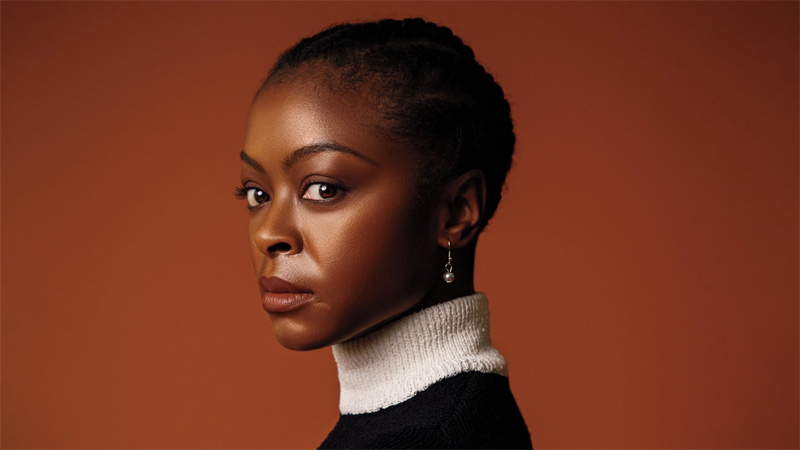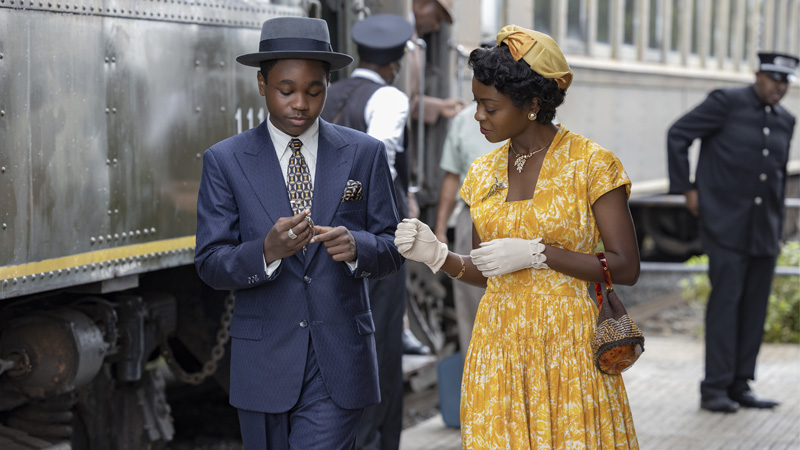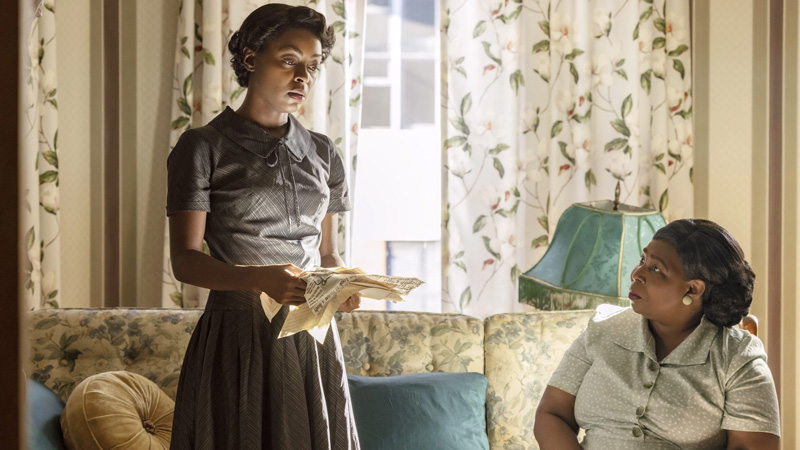
PHYLLIS ILLER
By Clayton Davis | Variety
Danielle Deadwyler had just moved to L.A. with her 13-year-old son and was in the middle of looking for an apartment when her reps gave her the script. “I can’t look for a place and read ‘Till,’” she remembers telling herself, but what she meant was, “Who wants to read about the mutilation and murder of a 14-year-old boy in Mississippi?” Still, at the encouragement of her agent, Deadwyler read the screenplay—a third of it one day, another third a few days later, and then, a few days after that, the end. It took her a week, but she still wasn’t rushing towards the project. She found an apartment, moved in, put together demo of a couple of courtroom scenes from the movie, and started focusing on stacks of boxes and empty cabinets.
Then she got a call saying that the director wanted to see another tape—this one of the scene at the funeral home, when 14-year-old Emmett Till’s mother, Mamie Till, sees her son’s mangled body for the first time. Out of excuses, Deadwyler told her son that she was going to be making some noise for an audition, and he should ignore her for a couple of hours. Then she walked to the back of the empty apartment, locked herself in a closet and began screaming.
Emmett Till’s brutal murder in 1955 shocked the nation and galvanized the Civil Rights movement. And “Till,” written by Michael Reilly, Keith Beauchamp and Chinonye Chukwu, personalizes that story by focusing on Mamie and her emotional journey. Before Emmett’s death, Mamie is indifferent to politics, but after, she refuses to yield to her bottomless grief. Instead, she demands that his unrecognizable body be displayed in an open casket to shame a society that would have preferred to look the other way. Over time, she becomes involved in the legal effort to bring his killers to justice, at first reluctantly agreeing to testify but emerging as a leading spokesperson for the NAACP.
“We’re watching somebody literally step into their power,” Deadwyler says, “and that’s inspiring for people.”
It’s a Friday in October, mere days after “Till” debuted to glowing reviews and a passionate standing ovation at the New York Film Festival. Deadwyler, 40, has stopped by the Variety studio to record a podcast, and the woman who sits before me is authentic and comfortable. She’s casual in a black T-shirt and beanie, like someone from the block that I would hang out with while growing up in the Bronx. This southern girl, born in Atlanta, has a sly sense of humor and a ready, hearty laugh. A lot of our discussion is heavy, but Deadwyler lightens things up here and there by talking about her love of the Food Network and breaking out her spot-on Gollum impersonation, perfectly capturing “The Lord of the Rings” villain’s guttural wheeze. She’ll later tell me that that’s her thing: embodying contradictions, tango-ing with conundrums. Deadwyler notes that the same applies to the way the film shows both the beauty of a young Black boy on the day of his death and the hideousness of his wounds.
When I ask Deadwyler how she prepared for the role of Mamie, she says she read Mamie’s memoir, “Death of Innocence: The Story of the Hate Crime that Changed America,” and looked at some archival footage from the time to get a sense of the environment, but that was about it. So I push her—did she speak to members of the family, watch movies about Till? How did she get into Mamie’s headspace?
“The ‘headspace’ is from the beginning, right?” she says. Deadwyler can be fierce, but not at all unkind. “I mean, even to this day — to this day, literally to this very day — a little black boy, 15 years old, was shot by a police officer in Mississippi. And that’s all I need. I mean, I don’t know how much more to I need to pull from.” Just the reality of the part alone was enough preparation, Deadwyler says. “Incessant mourning like that,” she adds, “takes a toll on the body.”

Lynsey Weatherspoon / Orion Pictures
Deadwyler has been aware of her own profound physicality from the time she was three or four years old, when her mother would watch “Soul Train” and Deadwyler would dance in front of the TV. Seeing an innate talent in the little girl, Deadwyler’s mom signed her up for dance classes, which she loved. By seven, she was doing dance theater. Her first memory of performing is playing one of the four little girls killed in the 1963 16th Street Baptist Church bombing in Alabama. “That kind of historical load being put on my psyche is kind of my thing, apparently,” she says, and smiles, not at all sweetly.
She kept dancing after that—through college at Spelman, and graduate school at Columbia (where she got a masters in fine arts)—after which she had a full-blown career playing small parts in movies and television: She popped up as a graphic novelist who ignites a movement in a post-apocalyptic future in HBO’s limited series “Station Eleven” and nearly stole the star-studded Netflix’s western “The Harder They Fall” from Idris Elba and Jonathan Majors with her turn as an androgynous gunslinger.
By the time she and her son arrived in Los Angeles, then, she’d lived a full life. “I don’t know what this would be like if I were 20,” she says now. “If I had not had the experience of a past marriage or the experience of being a mother to a 13-year-old at the time of filming. I’ve encountered many women, men, nonbinary, queer, beautiful folks who have mothered me along the way. They taught me to rest everything in the experience, not the reception.”

Danielle Deadwyler as Mamie Till-Mobley and Whoopi Goldberg as Alma Carthan in ‘Till.’
©United Artists/Courtesy Everett Collection
Longtime friends and fellow producers Barbara Broccoli and Frederick Zollo asked Oscar-winner Whoopi Goldberg 12 years ago if she would be involved with the making of “Till,” eyeing her to play the role of Mamie. “That’s how long this took to get going,” Goldberg says. Twelve years later, Goldberg had aged out of the part, and now has a small but effective role as Mamie’s mother, Alma. “I have to say, I don’t think I could have done justice the way Danielle has. It needed her.”
It was the tape that Deadwyler made that day while her son sat in their new, empty apartment that pushed “Till” director Chinonye Chukwu to ask to sit down with the actress. “She blew me away,” she says. “She has that rare quality of commanding screen presence. She’s a star.”
Back at Variety, I ask Deadwyler about how she feels about all the stellar reviews and talk of Oscar buzz for her performance as Mamie. “How are you processing this ride?” I say.
“How am I processing this ride?” she says and laughs, because all the attention is new, vaguely surreal, and a bit over the top. I hear more than a hint of fatigue in her voice. “Day by day? I don’t talk about reviews. I don’t talk about the Oscar stuff. People throw it out and I just put it in a little side pocket and leave the jacket.”
But there’s something unforgettable about the depth of pain and resolve that Deadwyler exhumes in “Till.” It’s an Oscar-worthy achievement. I can’t shake the image of Mamie running her hands across Emmett’s unrecognizable body to examine every nook and cranny to ensure this was her sweet boy. Deadwyler is calculated and precise about when she chooses to go big in a moment, aware of the volcanic force she can unleash, but can also keep that power simmering beneath the surface. At a key moment of grief, only her lip quivers, showing both her fortitude and her barely controlled anguish.
This is just the beginning of an exciting new chapter for Deadwyler, who seems certain to have Hollywood lining up with offers. She’s currently filming “Carry-On,” a new thriller from Steven Spielberg’s Amblin Entertainment that co-stars Taron Egerton and Jason Bateman, and more high-profile projects are likely on the horizon. But for now she wants to keep the focus on the message of the movie.
“If an awards conversation is being had, it’s all beautiful, but let’s pivot it to Mamie, because that’s why I did it,” she says. “That’s why we all did it.” She adds, “Because we’re still dealing with oppressive states in this nation and across the globe. So we need people to continue to tell us not to remain indifferent. We need people to inspire us to find the energy to continue to fight for the pursuit of a good life.”
Deadwyler gets teary-eyed when recalling a pivotal section of Mamie’s memoir, in which she talks about her son’s slaughter. “It wrecks me,” she says. “Mamie talks about Emmett in his final moments, calling for two people — mom and God — and neither of them can answer.”
Deadwyler grows quiet.
“Well, one did, right?” she says suddenly, referencing Mamie and her remarkably courageous battle to ensure that Emmett’s murder was not in vain.
